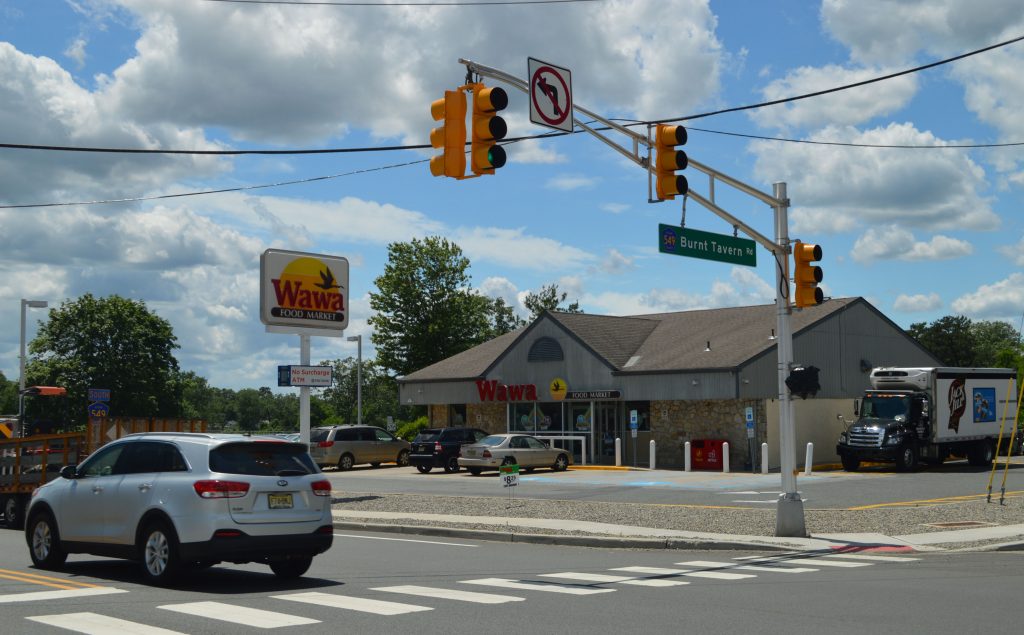
The Wawa store at the corner of Burnt Tavern and Lanes Mill roads in Brick, N.J. (Photo: Daniel Nee)
It’s been almost a year since Wawa proffered a relatively simple plan: turn their location on Lanes Mill Road into a larger one with a gas station. They bought the property next door, where a Chinese take-out restaurant had closed, and all seemed calm in a would-be world where hoagies and fill-ups could coexist next to a new Parkway interchange.
Then, the Board of Adjustment (also known as the zoning board) met for the first time to hear Wawa’s application. There was only one objector, and he hired an attorney notorious for his vigorous opposition skills and willingness to stretch hearings out for months’ worth of meetings. It isn’t unusual for someone to object to a project that requires a zoning variance, but in this case, the objector lived miles away from the property in question.
The question as to why Jalil Jallo, a Summit Avenue resident, would spend thousands of dollars on a legal team and engineers to oppose a seemingly ordinary gas station application wasn’t initially clear – but then the scuttlebutt emerged that Jallo might be the owner of a number of competing Exxon gas stations, including one down the road at the intersection of Route 88 in Lakewood. Public records show the names match up, but Jallo’s attorney, Edward Liston, has repeatedly refused to divulge why his client is opposing the application and whether he is, indeed, the owner of the competing filling station at all. The controversy devolved into a bevy of threats between attorneys at Tuesday night’s zoning board hearing which, after lengthy cross-examinations on Liston’s part, was adjourned until May 15 – representing another two-month delay for work on the new Wawa to begin.
|
|
When asked directly by John Jackson, the Brick attorney representing Wawa, whether his client “is a principal, or working on behalf, of a competitor,” Liston responded, “I have no idea.”
“All I know is his name and his address,” Liston told Jackson, as well as board members and the board attorney, John Miller.
The three hours’ worth of cross-examinations that ensued culminated in a blow-up when Liston said he would call additional witnesses of his own who would take hours to testify, essentially guaranteeing the Wawa application would not see a vote Tuesday night.
Jackson, and a Wawa corporate attorney, said Liston’s client has a legal responsibility to declare whether he owns a competing business. Hiding that information could produce a lawsuit in and of itself, he argued.
“A nonresident competitor does not have standing to object to an application,” said Jackson. “It is evident that this is an action by a competitor to hinder and delay an application.”
Zoning board meetings are quasi-judicial. In order for developers to obtain variances, they must meet criteria within the law. In Brick, the municipal land use ordinance does not address modern combinations of full-service convenience stores and filling stations without garages attached, so any application proposing such a business must receive a variance. By the same token, objections must also stay within the confines of the law. A published opinion from the U.S. Third Circuit Courts of Appeals (ironically, involving a proposed Wawa in Pennsylvania) states that board members can question the credibility of objections brought by competitors of a proposed business. And under state statutes, the simple fact that a new business would compete with an existing one is not an acceptable reason to deny variance relief. Without definitively knowing whether Jalil Jallo, the objector, is the same Jalil Jallo who has an interest in a competing gas station, the board found itself in a quandary.
Steven Nehmed, Wawa’s corporate counsel, was enraged when it was determined that the next available hearing date wouldn’t be until May 15.
“This is not the first time Wawa, my client, has been opposed by Mr. Liston,” he said, describing a grueling process in getting a South Toms River location approved that stretched for nine meetings. “We believe this is a bad faith objection to a land use case. It is not supported by something in honesty and fact.”
The South Toms River Wawa was approved, but eventually was the subject of a lawsuit that made its way up to the Appellate Division of state Superior Court.
Jackson also took aim at Liston, who has been his foe in previous cases, including a high-profile string of hearings related to the redevelopment of a portion of Camp Osborn in which the two attorneys frequently traded barbs. Jackson, in that case, accused Liston of staging a “filibuster.” That application was ultimately approved, but was also litigated in court and vacated by a judge over the breadth of variances requested.
“He just eats up the board’s time, and we don’t think it’s fair to the board or fair to the applicants,” said Jackson.
Liston, known for his animated cross-examinations and deep knowledge of both the technical and substantive attributes of the state’s Municipal Land Use Law, stood largely silent while Jackson and Nehmed hurled threats of litigation at him and his absentee client. But when the board reconvenes in May, the question as to the objector’s motives will – in all likelihood – finally be answered.
Miller, the board’s attorney, sided with Jackson’s argument about Jallo.
“Mr. Jackson is entitled to an answer tonight,” he said at the start of the meeting. “He did ask it at the last hearing, and under the case law he is entitled to that information.”
By the end, Miller offered a more firm demand.
“I am reserving the right for my board to subpoena your client,” he said.
Liston’s response: “What if he’s not here? What’s going to happen then?”

Advertisement

Police, Fire & Courts
Grand Jury Indicts Point Pleasant Man, Once a Fugitive, for Attempted Murder








